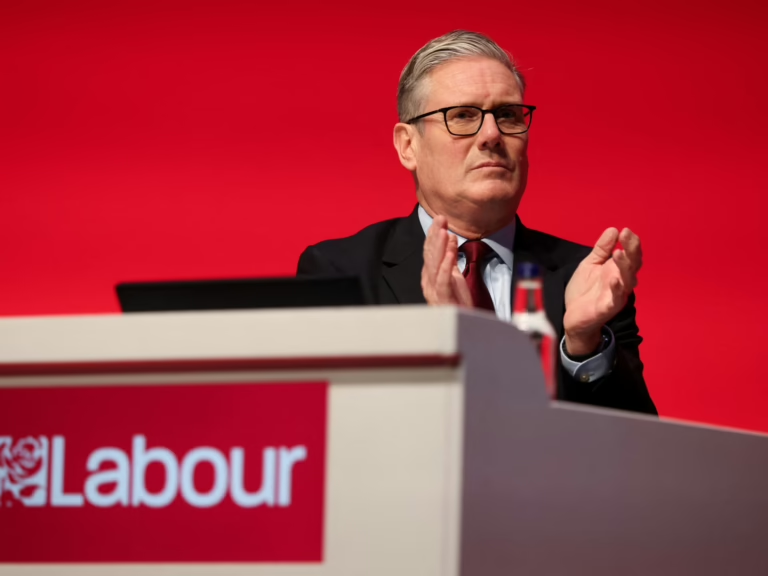London, United Kingdom – How dire is Keir Starmer’s current political predicament? And how much time remains for the UK prime minister to reverse his fortunes?
It is remarkable that such questions are now being seriously considered.
Recommended Stories
list of 4 itemsend of list
Just over a year ago, in July 2024, Starmer led the Labour Party to a commanding victory. Labour secured 411 seats in the House of Commons, achieving a majority of 174.
This overwhelming majority led many to believe that Starmer and Labour would enjoy at least two parliamentary terms-roughly a decade-to implement their vision for the UK after 14 years under Conservative rule.
Yet, current polling suggests a dramatic shift: the Reform Party, once dismissed as a fringe protest group, is now poised to win the next general election amid growing public frustration over economic conditions and immigration.
Recent data from the Sunday Times MRP poll paints Starmer as the most unpopular prime minister in history.
With Manchester’s Mayor Andy Burnham hinting at a potential leadership challenge, Starmer’s tenure could end before the scheduled 2029 election-unless an early poll is called by the incumbent or his successor.
Chris Francis, a retired educator and Labour voter, shared with Al Jazeera: “Starmer’s main promise was change-that was his campaign’s core message. Yet, little has shifted. Although wages have nominally outpaced inflation, many don’t feel the benefit. He’s not the worst PM, but he failed to set realistic expectations before the election.”
Starmer’s difficulties can be categorized into three main areas: tangible policy challenges, damaging public perception, and controversies.
The controversies revolve around tax issues linked to property dealings involving Starmer and his former deputy, Angela Rayner.
Starmer purchased a plot of land behind his parents’ home for £20,000 ($27,000) to keep donkeys, later selling it for £300,000 ($400,000). Questions remain about whether he properly paid taxes on the profit. While he denies any wrongdoing, the situation remains ambiguous.
Individually, this incident might seem minor, but it feeds into a broader narrative. Starmer, a distinguished barrister, was expected to bring a legalistic integrity and intellectual rigor to the premiership.
Instead, he appears to be struggling to clarify legal matters or articulate a clear plan for the electorate that supported him.
On a practical front, Labour has lost the trust of the business sector it worked hard to court before the election.
Specifically, an increase in National Insurance contributions for employers has triggered layoffs, particularly in the already fragile hospitality industry. Consequently, unemployment is climbing while job vacancies decline.
Persistent and severe unpopularity
James Crouch, an analyst at polling firm Opinium, suggested Starmer’s leadership might be “irreparably damaged.”
“Starmer’s approval ratings are remarkably poor. This sustained unpopularity is striking, especially since many have forgotten how this situation developed,” he remarked.
One of Starmer’s most pressing issues is the ongoing challenge of undocumented immigration, a problem that has eluded successive governments.
Despite numerous pledges to increase housing supply, progress remains sluggish. Labour now commits to constructing 1.5 million new homes by 2029, yet planning approvals in England have plummeted to historic lows this year.
Moreover, Starmer risks alienating nearly all voter segments.
Within his own party, some members and MPs criticize him for not being sufficiently left-wing.
Conversely, the business community views his policies as overly progressive.
For the average citizen, his handling of undocumented immigration has been inadequate, fueling the rise of the Reform Party under Nigel Farage.
Farage confidently predicts he will become the next prime minister, a claim supported by polls showing Reform leading Labour by 12 points.
Regarding economic matters, James Bentley, director at Financial Markets Online, cautioned that business confidence remains fragile despite recent announcements of £150 billion ($200 billion) in US investment deals during President Donald Trump’s state visit.
“Dismal economic indicators are likely causing alarm within Downing Street,” Bentley said. “Britain’s manufacturing sector is contracting at its fastest pace since March, with demand weakening both domestically and internationally.
“Employers face intense wage pressures, and the combination of shrinking profit margins and falling demand is increasingly problematic.”
Political commentators argue that Labour entered government unprepared, possessing a strategy to win elections but lacking a coherent plan to govern effectively. A negative narrative has taken root, even in areas where it may be undeserved, as Labour struggles to communicate its message.
In comparison to other European nations, the UK’s economic situation is not as dire, and public discontent over immigration is hardly unique.
Giles Kenningham, a strategist at London-based Trafalgar Strategy, observed, “[Starmer] is disadvantaged by the presence of a clear alternative in Andy Burnham. His victory was more a result of Conservative decline than a Labour resurgence, and that reality is becoming evident.
“There was no clear direction or compelling narrative. He needs a unifying vision, a goal to rally people around. But that is missing. What exactly does Starmerism stand for? It remains undefined.”
What is undeniable is that public tolerance for Starmer’s promised reforms is rapidly diminishing.
In the Financial Times, NatWest Bank chairman Rick Haythornthwaite commented: “These are challenging times for politicians of all stripes.
“Leaders no longer have the luxury of time to establish themselves. The political landscape is fracturing, and the notion that Farage could secure a majority government is no longer far-fetched.”

















